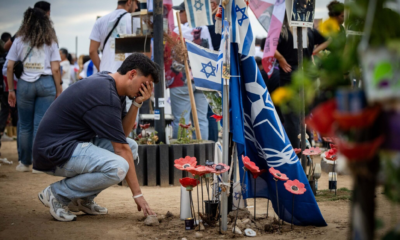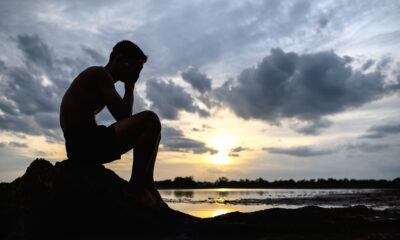
Featured Item

Help is ‘just a call away’
Recent suicides and attempted suicides in the community have prompted action across the spectrum to promote mental health and offer assistance to those in despair.
“Please reach out” is the message from experts.
“There’s 24-hour help. You’re not alone,” said Saul Tomson, the chief executive officer of the Chevrah Kadisha.
The situation is concerning, insiders say, prompting urgent attention by stakeholders in the mental-health arena as well as communal leaders and rabbonim.
“We need to tackle the real issues, and it’s not the African National Congress, the International Court of Justice, EL AL, crime, or anything else, it’s our community that’s at breaking point, some people are at their wits end,” said Rabbi Levi Avtzon of the Linksfield Senderwood Hebrew Congregation.
Suicide is a serious global public-health problem, Avtzon said, but in this community, it seems to have been an issue for years. “People spend countless conversations around the Shabbos table talking about crime, but we’ve never had a mature conversation about suicide.”
The SA Jewish Report is aware of the numbers, but one of the dilemmas of dealing with suicide and suicidal tendencies is something called the “Werther effect”, a phenomenon in which cases of suicide increase after media reports about them. This makes it tough to raise awareness of such a devastating growing public health problem and prevent it from spreading.
Tomson said the Chev’s social services team was “very aware” of the stress, anxiety, and pressure the community is experiencing.
“Some of it is the result of the truly terrible and traumatic events in Israel, which is taking its toll, and much is the result of local financial, political, and emotional distress,” he said. “In our world of constant connectivity, it’s paradoxical that a growing number of people are feeling alone and isolated. They see no way out, and fail to realise that help is just a conversation away.
“Having someone who hears you, sees you, and responds to you in a helpful way, can be the ‘difference that makes a difference’,” he said.
Johannesburg mother Alison Wise, 55, reached the end of her tether several years ago after a gambling addiction left her penniless and in debt. Desperate and ashamed, she attempted suicide which left her on life support and thereafter unable to walk for several years. “The Chevrah Kadisha brought me back to life,” she told the SA Jewish Report this week.
The welfare organisation paid for her months-long rehabilitation, and provided her with accommodation and work literally to get her back on her feet.
“I’m proof that it’s possible to pick yourself up even when all the odds are against you,” Wise says. “It’s never as bad as you think. Reach out. There’s help 24/7. Don’t do it. Your family will suffer. I broke my daughter’s heart, and it takes years to repair the relationship.”
Bullied and ostracised from a young age for being different, Brad Seef, 26 – not his real name – attempted suicide several times as a “desperate cry for help”.
“I bottled all my feelings, which led to depression and violent outbursts. I made the wrong choices, which led me down the wrong path. Eventually it all became too much.” He began seeing a social worker at the Chev, which helped turn his life around.
“All you need is one or two people to talk to, to help offload this heavy burden. I realised I didn’t have to suffer in silence or alone. There were good people willing to listen to me and guide me, I just had to take a leap of faith.”
The Chev is also working to educate community members, medical and psycho-social professionals, rabbinical leaders, and healthcare workers on how to support sufferers of anxiety and depression.
While the Chev is at the coalface, rabbis shoulder the pain.
“The anxiety levels that this community live under are unsustainable,” said Avtzon, who has been at the forefront of this discussion.
“We live at a crazy level of panic, unlike anywhere else in the world. South Africans live in heaven but think they’re in hell, which is causing a tremendous amount of despair,” he said.
People are already on the edge, and perhaps some of our communal anxiety is pushing them over the edge. Life is tough and chaotic everywhere, but over here, we’ve created such a high bar of what a good life is, and many people can’t match up.”
“Rabbonim are personally affected by losses of this nature, needing to support in the early stages, during the mourning period, and well beyond,” said Rabbi Yossi Chaikin, the chairperson of the South African Rabbinical Association (SARA), this week.
SARA has arranged a briefing for rabbis with Rabbi Herschel Shachter, world-renowned posek (religious law authority) and rosh yeshiva at RIETS, Yeshiva University in New York, on the religious approach to the subject. Rabbis have also consulted with social workers to gain a better understanding.
Sheri Hanson, a social worker at Hatzolah, said, “January and February are always difficult months, where people may feel they are faced with yet another year of the same overwhelming struggles.”
“Although mental health is gaining more airtime, it remains shrouded in stigma. We need to emphasise help-seeking as a strength, make people aware of the resources that are available, and encourage a general ethos of kindness. We need to make more of an effort to connect to people, and help them feel that they aren’t alone. It’s important for people to know that there are many avenues of assistance in our community,” she said.
FOR HELP CONTACT
The Chev’s 24-hour confidential helpline on 082 499 1010
Hatzolah Connect teen text line SMS Talk to 44918 (free)
Jewish Community Services 011 532 9616 / 082 499 1010
Koleinu SA Helpline 011 264 0341
The Ki (counselling service) 065 533 4442
ChaiFM 24 hour national toll free confidential helpline 0800 242436
Life Line Crisis Line 0861 322 322
South African Depression and Anxiety Group 0800 12 13 14










